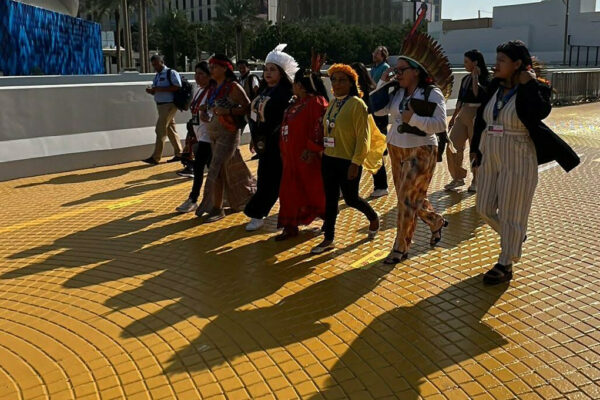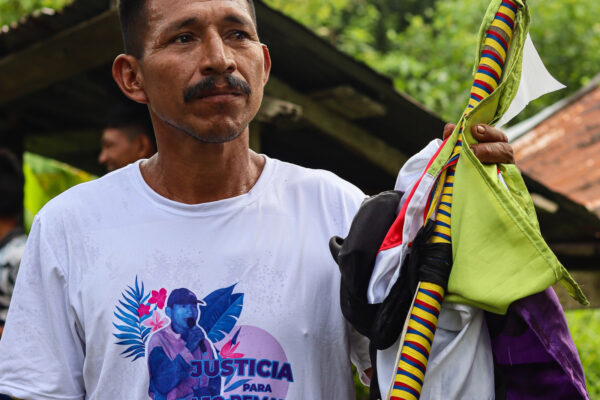São Paulo – More than 60 NGOs, including Amazon Watch, in partnership with the Association of Brazil’s Indigenous Peoples’ Association (APIB) delivered a letter today to the Brazilian Congress, foreign investors, and European parliamentarians demanding five emergency measures to contain the deforestation crisis in the Amazon rainforest, including the establishment of a moratorium on logging for at least five years.
Estimates set to be released this week by Brazil’s National Institute for Space Research (INPE) will show deforestation increased by at least 28 percent during the current monitoring year, which runs from August through July, compared with the previous year.
In April, responding to calls for international support in the face of the COVID-19 pandemic, Amazon Watch partnered with Indigenous communities, federations and organizations in the Amazon, to issue a statement in solidarity with their demands calling for an Amazon-wide moratorium on any extractive activity or industry that involves the entering of foreign persons or an increased military presence in indigenous territories.
“All the measures listed in the letter can be done. Some of them are even constitutional obligations, which the government is not fulfilling. The objective is to resolve an acute situation in which the patient – in this case, the Amazon – is in a life-or-death situation and, then, to discuss the structural measures that will allow the patient to recover. Some of the [measures] were already included in the plan for the prevention and control of deforestation that were abandoned by the Bolsonaro administration,” said Marcio Astrini, the Executive Secretary of Climate Observatory, a coalition of Brazilian NGOs and social movements who led the initiative with APIB.
FIVE EMERGENCY MEASURES TO FIGHT THE DEFORESTATION CRISIS IN THE AMAZON
Amazon Forest destruction reached 10,129 km2 (2,623,399 hectares) between August 2018 and July 2019, an increase of 34 percent over the previous period. In 2020, official data point to a similar increase over 2019. This scenario is accompanied by an increase in violence, forest fires, public land grabbing, as well as the expansion of illegal mining, and other illegal activities, especially invasions of Indigenous lands and protected areas.
Among the reasons for this situation is the irresponsible stance adopted by the president of Brazil, who has embraced a perverse and overtly anti-environmental and anti-indigenous agenda, attacking the Constitution itself. As a consequence, investors and international companies threaten to withdraw their business from Brazil, which would intensify the current economic crisis and threaten jobs, aggravating the country’s inequality and poverty.
In the past, Brazil was able to reduce the rate of deforestation in the Amazon and, at the same time, promote an increase in agricultural production and exports, generating jobs and economic growth. The current government, however, does not appear to have any interest or capability to follow this path. Its actions are based on fallacious measures and advertising campaigns that try to mask the reality of the facts. Not even sending military forces to the Amazon has generated effective results.
The solution to the current crisis will not come from the adoption of theatrical measures. The organizations that subscribe to this letter understand that rigorous actions are needed to face such an acute crisis. Below are five emergency lines of action that we believe should be implemented as soon as possible*:
- Moratorium on deforestation in the Amazon.
Prohibition of any deforestation in the Amazon for at least five (5) years, with exceptions made for subsistence agriculture and practices of traditional populations, smallholder agriculture, sustainable forestry, works of public utility, and national security issues. - Increased penalties for environmental crimes and deforestation.
Increase in penalties for illegal deforestation and for the actions of those who order and finance environmental and land crimes, as well as illegal invasion and commercialization of public lands.
Creation of a task force to suppress land crimes, especially land grabbing and invasion of public lands.
Creation of a task force to ensure the eviction of invaders and the cessation of all illegal activities in territories occupied by traditional peoples and communities, mainly Indigenous lands and the surrounding areas, such as land grabbing, deforestation, theft of wood, mining, livestock, and illegal mining.
Immediate freezing of assets of the country’s 100 biggest forest offenders.
Extreme rigor in the application of the provisions of the Environmental Crimes Law (Law No. 9,605/1998 and Decree No. 6,514/2008), including the banning of violators and the destruction of equipment used in the practice of environmental crimes. - Immediate resumption of PPCDAm – Action Plan for Prevention and Control of Deforestation in the Legal Amazon.
Immediate resumption of the government measures and actions provided for in the four axes of the PPCDAm (Land and Territorial Planning; Monitoring and Control; Promotion of Sustainable Productive Activities; Economic and Regulatory Instruments). This resumption would need to include guaranteed resources, targets, timetables, and detailed implementation plans, with transparent accountability and social participation. - Demarcation of indigenous and quilombola lands and creation, regularization, and protection of Conservation Units.
Immediate Presidential recognition decrees for Indigenous lands that have already been demarcated.
Immediate demarcation of Indigenous areas whose processes are pending actions to be taken by the Federal Government.
Protection of all Indigenous lands, regardless of their titling stage, with special attention to lands occupied by peoples in voluntary isolation or those subject to recent contact.
Implementation and effective consolidation of the conservation units (such as parks, national forests, and extractive reserves) that have already been created.
Creation of conservation units covering ten million hectares, according to the map of priority conservation areas, integrated management sites, and new strategic areas for the conservation of biodiversity and combating deforestation.
Issuing property titles to those who live in quilombola (maroon) territories. Recognition and regularization of quilombola territories that have been subject to claims. - Restructuring of Ibama, ICMBio, and Funai.
Restoring the institutional powers and authority of Ibama and ICMBio, so that they can resume their role in the fight against deforestation and environmental crimes.
Urgently hold a competitive hiring process for new environmental agents for Ibama and ICMBio, primarily in environmental inspection activities.
Replacement of the managers of the three agencies, who are not technically qualified to occupy such positions, by specialized personnel.
Restitution of Funai’s institutional responsibilities, aimed at protecting and promoting indigenous rights, mainly related to the demarcation and protection of indigenous lands.
* These emergency measures must be implemented without prejudice to structural policies, such as programs and projects aimed at the achievement of sustainable development, the resumption of the activities of the Amazon Fund and of the Climate Fund, pacts with the productive sector and the reinforcement of green investments, most of which are already included in the PPCDAm itself.
Signed by
- Articulação dos Povos Indígenas do Brasil – APIB
- Observatório do Clima
- Coordenação Nacional de Articulação das Comunidades Negras Rurais Quilombolas – CONAQ
- Articulação Nacional de Agroecologia – ANA
- Conselho Nacional de Seringueiros – CNS
- Central Única dos Trabalhadores – CUT
- Associação Brasileira de Organizações não Governamentais – ABONG
- Fórum Brasileiro de ONGs e Movimentos Sociais para o Meio Ambiente e o Desenvolvimento – FBOMS
- Movimento dos Trabalhadores Rurais Sem Terra – MST
- Grupo Carta de Belém
- Rede Brasileira de Educação Ambiental – REBEA
- Rede GTA – Grupo de Trabalho Amazônico
- GT Infraestrutura
- APREMAVI
- Instituto Socioambiental – ISA
- WWF Brasil
- Instituto de Estudos Socioeconômicos – INESC
- Instituto do Homem e Meio Ambiente da Amazônia – Imazon
- Instituto de Manejo e Certificação Florestal e Agrícola – Imaflora
- FASE – Solidariedade e Educação
- Projeto Hospitais Saudáveis
- Uma gota no oceano
- SOS Amazonas
- Instituto de Desenvolvimento Sustentável da Amazônia – Idesam
- Mater Natura
- Engajamundo
- APREC – Ecossistemas Costeiros
- Climainfo
- Instituto Democracia e Sociedade – IDS
- Instituto Centro de Vida – ICV
- Instituto Internacional de Educação do Brasil – IIEB
- Amigos da Terra
- 350.org
- Projeto Saúde e Alegria
- BVRio
- Grupo de Estudos em Educação e Meio Ambiente – GEEMA
- Rede de Educadores Ambientais da Baixada de Jacarepaguá
- Elo RJ – Rede de Mulheres Ambientalistas da América Latina
- Comitê Chico Mendes
- Terra de Direitos
- Memorial Chico Mendes
- Associação Etnoambiental Kanindé
- Defensores do Planeta
- Associação Agroecologia Tijupá
- Argonautas Ambientalistas da Amazônia (Belém-PA)
- Rede de Educação Ambiental e Políticas Públicas – REAPOP (Nacional)
- Teko Porã Amazônia (Belém-PA)
- Amazon Watch
- Instituto de Pesquisas Ecológicas
- Greenpeace Brasil
- Rede de Educação Ambiental da Bahia – REABA
- Associação Cultural APA Itacaré Serra Grande
- Associação Alternativa Terrazul
- Toxisphera – Associação de Saúde Ambiental
- Associação de Defesa do Meio Ambiente de Araucária – AMAR
- Movimento SOS Cerrado
- Rede de Educação Ambiental do Paraná
- International Rivers
- Rede de Educação Ambiental da Costa Verde
- Rede de Educação Ambiental do RJ – REARJ
- Operação Amazônia Nativa – OPAN
- Fundação Amazônia Sustentável – FAS













